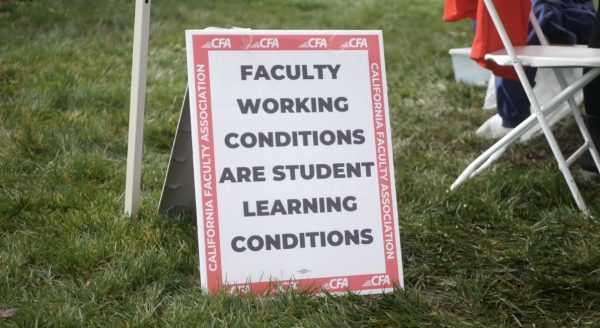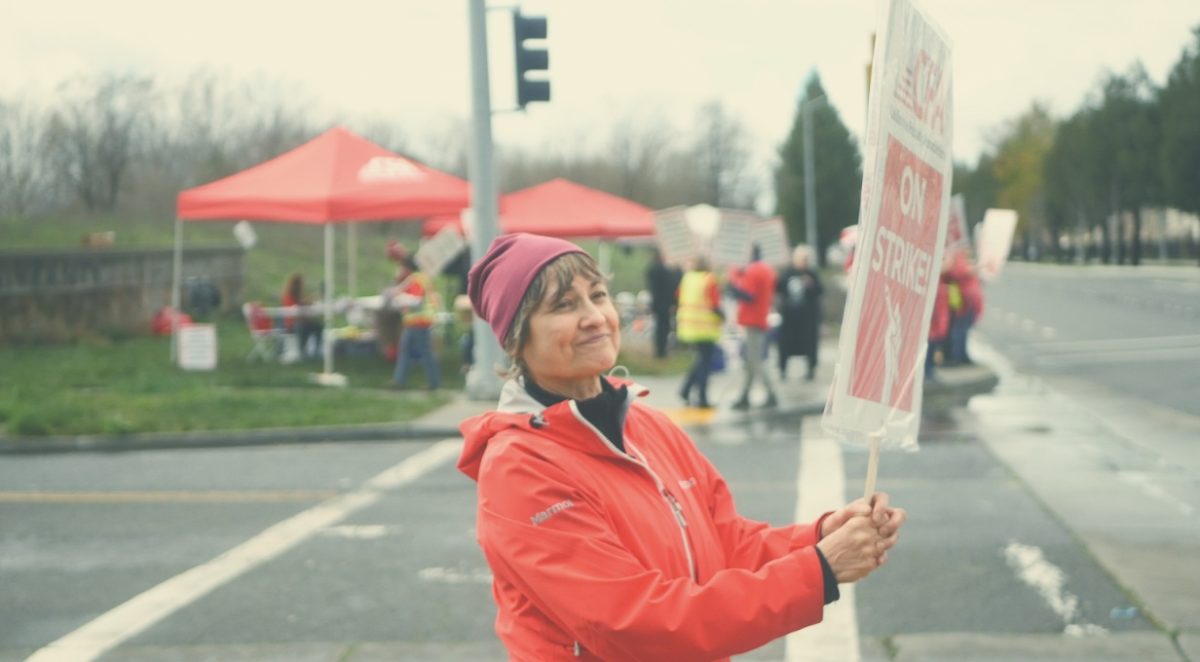“Faculty working conditions are student learning conditions.” Many on campus might have heard or seen the phrase by the California Faculty Association, the union that led the strike at Sonoma State on Monday, Jan. 22, as well as across all CSU campuses.
The strike, originally planned for the whole week, was called off when the CFA and CSU administration reached a tentative agreement following the first day of the strike. Voting for the tentative agreement agreement starts on Feb. 12 and lasts until Feb. 18.
According to the California Faculty Association, “With a return to imposition, we would continue to advocate for a better agreement, though CSU management is not obligated to return to the bargaining table.”
Some of the main points of the tentative agreement, according to a statement released by CFA, is a, “5-percent General Salary Increase for all faculty retroactive to July 1, 2023 or retroactive to hire date if hired this academic year,” as well as a, “5-percent General Salary Increase for all faculty on July 1 in 2024, (contingent on the state not reducing base funding to the CSU),”
Salary increases are also promised to the, “Lowest-paid faculty in salary Ranges A and B,” according to the agreement. The tentative agreement also includes a Service Step Increase (SSI) of 2.65 percent for 2024-25, increasing paid parental leave from six to 10 weeks, as well as, “Increasing protection for faculty who have dealings with police by providing for a union rep in those interactions.” The deal also includes a provision for creating “better access” to gender-inclusive restrooms and lactation spaces, and a pathway to monitor issues of access.
The full details of the tentative agreement can be found on CFA’s website, at Calfac.org
“I did go to the strike and I liked it because it showed that the CSU really needed to reach an agreement, even though it was controversial,” said McLovin, a second year cinematic arts and technology major.
Others on the day of the strike stressed the importance of students’ mental health. “We have so few counselors on campus, I’ve had students in crisis and they can’t get an appointment for months at the counseling center,” said Wendy Ostroff, professor of cognitive and developmental science.
“We don’t have the resources for students that we once had. We have class sizes that keep growing and growing and growing and we can’t give students the individualized attention that we want,” said Ostroff.
“The industry standard is one to 1500 and we as faculty, we see our students struggle, and we try to connect them with mental health counselors and they have to wait forever to get an appointment,” said Brigitte Lahme, a mathematics and statistics professor at the picket line on Monday.
“That is incredibly hard for me to watch, seeing our students struggle. Getting emails in the middle of the night over the weekend from students who have been dealing with mental health but also just with so many demands, family obligations,” Lahme said, “Not having the support available is incredibly hard.”
Justine Law is a Professor of Ecology and Environmental Studies. “I am a tenured professor, but then [there] are lecturer faculty who do lots of work at the University and who are making non livable wages here in Sonoma County. And if faculty can’t live well, how can they be expected to teach well?” said Law.
According to Salary.com, “The cost of living in Cotati is 45.0% higher than the national average.”
“Sometimes, we’d do a job search here at Sonoma State. People would accept the job and then try to move here, realize they couldn’t as soon as they found out the high cost of living and the wage, realize they couldn’t actually make the move to work here,” said Loretta Esparza, a faculty librarian at Santa Rosa Junior College. Esparza was also at the picket lines in solidarity on Monday’s strike.
Esparza says that Sonoma State University has lost good people because of the high cost of living. She believes the CSU system is important to the surrounding communities so the pay should reflect that.
According to Bestplaces.net, “To live comfortably in Sonoma County California, a minimum annual income of $144,000 for a family, and $68,400 for a single person is recommended,”
“There is an imbalance and maybe most of us are noticing in our entire country, maybe around the world, but on this campus, the CSU management, huge salaries it’s been bloating,” said Margaret Anderson, acting director of the Hutchins Dialogue Center. “When I was a little girl, my mom went to this campus. It wasn’t like that. There were wonderful administrators who made reasonable salaries,” said Anderson. “Now there’s this huge bloat for a lot of administrators while as Justine said, 65 percent of CSU’s are taught by lecturers who get squeezed for the lowest possible salary, and often don’t even get benefits.”
Steve Estes is a history professor and labor historian at SSU. “The new student movement of the 1960s was called the New Left. It wasn’t as tied to organized labor as the old left had been in the 1930s and 40s. The new left of student activism in the 60s was supportive of unions, but it tended to organize outside of union structures,” said Estes.
“Although you’re talking about a strike at a university, I think a lot of this [current labor movement] has not been based in universities, it’s been much more organic in workplaces beyond University walls, so in that way, it’s much more like the 30s,” said Estes.
Estes also said that he was pleasantly surprised by the tentative agreement. “I know it’s a compromise and I know that I have friends on faculty who were very disappointed that the union didn’t get more than the tentative agreement suggests we will, but I actually felt like it was a pretty good compromise that the CSU administration although in the short run, they’re only giving us the 5% increase for one year, I think there’s a good chance that we’ll get 5% next year if the budget holds,”
“I was really excited that the CSU came to the table so quickly,” said Scott Horstein, Vice President of CFA Sonoma and Director of the Theatre Studies Program.

“Before, we had a series of demands, and the only demand that they would talk to us about was about the general salary increase,” said Horstein, “They wouldn’t talk to us about the other things, and to see that they actually would speak to us; It’s the first time that they took those proposals seriously.”
“We didn’t necessarily get everything that we asked for you never do negotiations, and some of the things we’re gonna have to keep fighting for,” said Horstein, “One thing in particular is there’s still work to do in terms of making sure that there are enough mental health resources for students. That’s something that’s foremost on my mind.”





































